9W2 Global Studies
Section outline
-
EXPLORE / TŪHURA learning intentions:
EXPLORE / TŪHURA learning intentions
- We are EXPLORING...
- to understand how exploration and innovation create opportunities and challenges for people, places, and environments
- We are EXPLORING...
- our prior knowledge in Maths, Science, PE and Health and English to understand that events have causes and effects and use this knowledge as a foundation for our Global studies context on Keeping ourselves safe.
Success criteria: How humans are born to explore the Earth and the sky to discover ways to constantly evolve and grow. Students are creating a knowledge bank into their long term memory using cross curricular pollination. They should then be able to hook and build on this as they focus on solving a problem within a context in global studies, Keeping ourselves safe.
- to link graph's x. y axis to the earth's equator and the prime meridian
- to link coordinates on a graph to the GPS grid onplanet Earth
- using Latitude and longitudes to find location on a map
- using longitude to calculate time difference
- using the tropic of Cancer, Capricorn and the equator to understand the seasons
- using angles to calculate Longitudes and latitudes
- locating true North and magnetic North to find directions
- locating the North star, Polaris and its use to find true North in the northern hemisphere
- Locating the Southern Cross and Archenar to locate true South in the souther hemisphere in Auckland's nigh sky
- locating Orion constellation in Auckland's night sky
- locating the constellation Matariki in Auckland's night sky
- sunlight - Infra red, royGbiv UV, vit D, melatonin,photosynthesis, foodchain, food CHNOFe.
- Life on Earth - Periodic table from 1 to 10 and 26 Iron,MrsCgren. Air, Co2, Ozone, Methane, Nitrogen, oxygen.
- Moon - 28 days cycle, month, tides, menstrual cycle.
Task: Introduction - A student introduces, when another student hears a common factor with the speaker the student will take the speaker's place till every has a turn.
World map: A3 world map to each student. Locate the continents, oceans, countries, directions, equator, Prime meridian, tropic of Capricorn, Tropic of Cancer, NZ co ordinates.
- We are EXPLORING...
Note taking and mindmapping skills. Diagrams in Google classroom.
HW: 1hour daily to create a habit.
HW check during session - long term memory.
-
EXPLORE / TŪHURA learning intentions:
- We are EXPLORING...
- to understand how exploration and innovation create opportunities and challenges for people, places, and environments
- We are EXPLORING...
- our prior knowledge in Maths, Science, PE and Health and English to understand that events have causes and effects and use this knowledge as a foundation for our Global studies context on Keeping ourselves safe.
Success criteria: How humans are born to explore the Earth and the sky to discover ways to constantly evolve and grow. Students are creating a knowledge bank into their long term memory using cross curricular pollination. They should then be able to hook and build on this as they focus on solving a problem within a context in global studies, Keeping ourselves safe.
- to link graph's x. y axis to the earth's equator and the prime meridian
- to link coordinates on a graph to the GPS grid onplanet Earth
- using Latitude and longitudes to find location on a map
- using longitude to calculate time difference
- using the tropic of Cancer, Capricorn and the equator to understand the seasons
- using angles to calculate Longitudes and latitudes
- locating true North and magnetic North to find directions
- locating the North star, Polaris and its use to find true North in the northern hemisphere
- Locating the Southern Cross and Archenar to locate true South in the souther hemisphere in Auckland's nigh sky
- locating Orion constellation in Auckland's night sky
- locating the constellation Matariki in Auckland's night sky
- sunlight - Infra red, royGbiv UV, vit D, melatonin,photosynthesis, foodchain, food CHNOFe.
- Life on Earth - Periodic table from 1 to 10 and 26 Iron,MrsCgren. Air, Co2, Ozone, Methane, Nitrogen, oxygen.
- Moon - 28 days cycle, month, tides, menstrual cycle.
Task: Introduction - A student introduces, when another student hears a common factor with the speaker the student will take the speaker's place till every has a turn.
World map: A3 world map to each student. Locate the continents, oceans, countries, directions, equator, Prime meridian, tropic of Capricorn, Tropic of Cancer, NZ co ordinates.
- We are EXPLORING...
Note taking skills. Mindmapping.
HW 1 hour daily creating a habit for learning.
Longterm memory check every session of previous class lessons.
-
EXPLORE / TŪHURA learning intentions:
- We are EXPLORING...
- to understand how exploration and innovation create opportunities and challenges for people, places, and environments
- We are EXPLORING...
- our prior knowledge in Maths, Science, PE and Health and English to understand that events have causes and effects and use this knowledge as a foundation for our Global studies context on Keeping ourselves safe.
Success criteria: How humans are born to explore the Earth and the sky to discover ways to constantly evolve and grow. Students are creating a knowledge bank into their long term memory using cross curricular pollination. They should then be able to hook and build on this as they focus on solving a problem within a context in global studies, Keeping ourselves safe.
- to link graph's x. y axis to the earth's equator and the prime meridian
- to link coordinates on a graph to the GPS grid onplanet Earth
- using Latitude and longitudes to find location on a map
- using longitude to calculate time difference
- using the tropic of Cancer, Capricorn and the equator to understand the seasons
- using angles to calculate Longitudes and latitudes
- locating true North and magnetic North to find directions
- locating the North star, Polaris and its use to find true North in the northern hemisphere
- Locating the Southern Cross and Archenar to locate true South in the souther hemisphere in Auckland's nigh sky
- locating Orion constellation in Auckland's night sky
- locating the constellation Matariki in Auckland's night sky
- sunlight - Infra red, royGbiv UV, vit D, melatonin,photosynthesis, foodchain, food CHNOFe.
- Life on Earth - Periodic table from 1 to 10 and 26 Iron,MrsCgren. Air, Co2, Ozone, Methane, Nitrogen, oxygen.
- Moon - 28 days cycle, month, tides, menstrual cycle.
Task: Introduction - A student introduces, when another student hears a common factor with the speaker the student will take the speaker's place till every has a turn.
World map: A3 world map to each student. Locate the continents, oceans, countries, directions, equator, Prime meridian, tropic of Capricorn, Tropic of Cancer, NZ co ordinates.
- We are EXPLORING...
Note taking skills. Mindmapping.
HW 1 hour daily creating a habit for learning.
Longterm memory check every session of previous class lessons.
-
EXPLORE / TŪHURA learning intentions:
EXPLORE / TŪHURA learning intentions
- We are EXPLORING...
- to understand how exploration and innovation create opportunities and challenges for people, places, and environments
- We are EXPLORING...
- our prior knowledge in Maths, Science, PE and Health and English to understand that events have causes and effects and use this knowledge as a foundation for our Global studies context on Keeping ourselves safe.
Success criteria: How humans are born to explore the Earth and the sky to discover ways to constantly evolve and grow. Students are creating a knowledge bank into their long term memory using cross curricular pollination. They should then be able to hook and build on this as they focus on solving a problem within a context in global studies, Keeping ourselves safe.
- to link graph's x. y axis to the earth's equator and the prime meridian
- to link coordinates on a graph to the GPS grid onplanet Earth
- using Latitude and longitudes to find location on a map
- using longitude to calculate time difference
- using the tropic of Cancer, Capricorn and the equator to understand the seasons
- using angles to calculate Longitudes and latitudes
- locating true North and magnetic North to find directions
- locating the North star, Polaris and its use to find true North in the northern hemisphere
- Locating the Southern Cross and Archenar to locate true South in the souther hemisphere in Auckland's nigh sky
- locating Orion constellation in Auckland's night sky
- locating the constellation Matariki in Auckland's night sky
- sunlight - Infra red, royGbiv UV, vit D, melatonin,photosynthesis, foodchain, food CHNOFe.
- Life on Earth - Periodic table from 1 to 10 and 26 Iron,MrsCgren. Air, Co2, Ozone, Methane, Nitrogen, oxygen.
- Moon - 28 days cycle, month, tides, menstrual cycle.
Task: Introduction - A student introduces, when another student hears a common factor with the speaker the student will take the speaker's place till every has a turn.
World map: A3 world map to each student. Locate the continents, oceans, countries, directions, equator, Prime meridian, tropic of Capricorn, Tropic of Cancer, NZ co ordinates.
- We are EXPLORING...
Note taking skills. Mindmapping.
HW 1 hour daily creating a habit for learning.
Longterm memory check every session of previous class lessons.
-
EXPLORE / TŪHURA learning intentions
- We are EXPLORING...
- to understand how exploration and innovation create opportunities and challenges for people, places, and environments
- We are EXPLORING...
- our prior knowledge in Maths, Science, PE and Health and English to understand that events have causes and effects and use this knowledge as a foundation for our Global studies context on Keeping ourselves safe.
Success criteria: How humans are born to explore the Earth and the sky to discover ways to constantly evolve and grow. Students are creating a knowledge bank into their long term memory using cross curricular pollination. They should then be able to hook and build on this as they focus on solving a problem within a context in global studies, Keeping ourselves safe.
- to link graph's x. y axis to the earth's equator and the prime meridian
- to link coordinates on a graph to the GPS grid onplanet Earth
- using Latitude and longitudes to find location on a map
- using longitude to calculate time difference
- using the tropic of Cancer, Capricorn and the equator to understand the seasons
- using angles to calculate Longitudes and latitudes
- locating true North and magnetic North to find directions
- locating the North star, Polaris and its use to find true North in the northern hemisphere
- Locating the Southern Cross and Archenar to locate true South in the souther hemisphere in Auckland's nigh sky
- locating Orion constellation in Auckland's night sky
- locating the constellation Matariki in Auckland's night sky
- sunlight - Infra red, royGbiv UV, vit D, melatonin,photosynthesis, foodchain, food CHNOFe.
- Life on Earth - Periodic table from 1 to 10 and 26 Iron,MrsCgren. Air, Co2, Ozone, Methane, Nitrogen, oxygen.
- Moon - 28 days cycle, month, tides, menstrual cycle.
Task: Introduction - A student introduces, when another student hears a common factor with the speaker the student will take the speaker's place till every has a turn.
World map: A3 world map to each student. Locate the continents, oceans, countries, directions, equator, Prime meridian, tropic of Capricorn, Tropic of Cancer, NZ co ordinates.
- We are EXPLORING...
Note taking skills. Mindmapping.
HW 1 hour daily creating a habit for learning.
Longterm memory check every session of previous class lessons.
-
FOCUS / ARONGA learning intentions:
- We are FOCUSING on developing and applying our knowledge about science and maths in ancient Egypt.
- We are FOCUSING on comparing the culture and traditions of ancient Egypt and how these evolved to modern day religions and traditions.
- We are FOCUSING on the megaliths of ancient Egypt and those found in NZ comparing and deducing that there might have been another civilizaiton before ours.
Awhinatanga: Culturally Connected
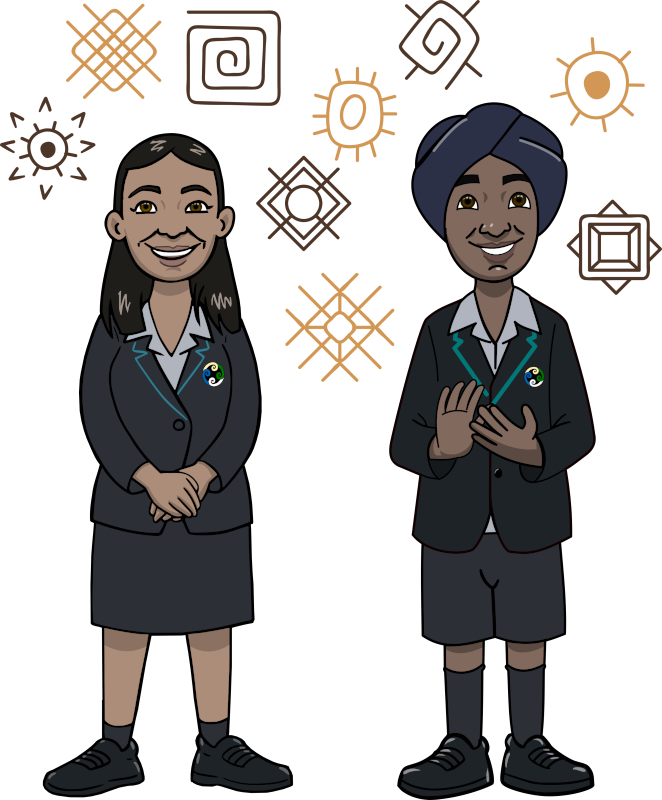
Enter text here...
Enter text here...
EXPLORE / TŪHURA learning intentions:
- We are EXPLORING..
- to understand how groups make and implement rules and laws.
- We are EXPLORING...
- to understand how exploration and innovation create opportunities and challenges for people, places, and environments
- We are EXPLORING...
- to understand that events have causes and effects
Enter text here...
-
Enter text here...
FOCUS / ARONGA learning intentions:
- We are FOCUSING on developing and applying our knowledge about science and maths in ancient Egypt.
- We are FOCUSING on comparing the culture and traditions of ancient Egypt and how these evolved to modern day religions and traditions.
- We are FOCUSING on the megaliths of ancient Egypt and those found in NZ comparing and deducing that there might have been another civilizaiton before ours.
Awhinatanga: Culturally Connected

Enter text here...
Enter text here...
EXPLORE / TŪHURA learning intentions:
- We are EXPLORING..
- to understand how groups make and implement rules and laws.
- We are EXPLORING...
- to understand how exploration and innovation create opportunities and challenges for people, places, and environments
- We are EXPLORING...
- to understand that events have causes and effects
Enter text here...
-
Enter text here...
FOCUS / ARONGA learning intentions:
- We are FOCUSING on developing and applying our knowledge about science and maths in ancient Egypt.
- We are FOCUSING on comparing the culture and traditions of ancient Egypt and how these evolved to modern day religions and traditions.
- We are FOCUSING on the megaliths of ancient Egypt and those found in NZ comparing and deducing that there might have been another civilizaiton before ours.
Awhinatanga: Culturally Connected

Enter text here...
-
Enter text here...
FOCUS / ARONGA learning intentions:
- We are FOCUSING on developing and applying our knowledge about science and maths in ancient Egypt.
- We are FOCUSING on comparing the culture and traditions of ancient Egypt and how these evolved to modern day religions and traditions.
- We are FOCUSING on the megaliths of ancient Egypt and those found in NZ comparing and deducing that there might have been another civilizaiton before ours.
Awhinatanga: Culturally Connected

Enter text here...
-
Kia Ora,
Welcome back to Term 2.
Learning Intentions:
The course of Aotearoa New Zealand’s histories has been shaped by the use of power.
Relationships and connections between people and across boundaries have shaped the course of Aotearoa New Zealand’s histories.
People hold different perspectives on the world depending on their values, traditions, and experiences.
Success Criteria:
I can understanding how is Anzac Day is a significant event in Aotearoa history
I understand NZ's participation in WW1 and the sacrifice our soldiers made for Aotearoa.I am also learning about their experiences through their biographies
I can identify the attitudes and values that motivated people in the past and compare them with attitudes and values of today
I can show empathy towards the ANZAC’S by learning about their experiences through their biographies
Activities:
DO NOW: Anzac Quiz (https://online.mhjc.school.nz/mod/page/view.php?id=92220)
- What is Anzac Day? (Discussion and video) - Class activity
- Fun Fact Anzac cards and worksheet (Group activity)
- Listen to the podcast
- Showing gratitude - messages and making poppies
-
Learning Intentions:
The course of Aotearoa New Zealand’s histories has been shaped by the use of power.
Relationships and connections between people and across boundaries have shaped the course of Aotearoa New Zealand’s histories.
People hold different perspectives on the world depending on their values, traditions, and experiences.
Success Criteria:
I can understanding how is Anzac Day is a significant event in Aotearoa history
I understand NZ's participation in WW1 and the sacrifice our soldiers made for Aotearoa.I am also learning about their experiences through their biographies
I can identify the attitudes and values that motivated people in the past and compare them with attitudes and values of today
I can show empathy towards the ANZAC’S by learning about their experiences through their biographies
Activities:
DO NOW: Recap
- Documentary (https://www.nzonscreen.com/title/gallipoli-the-new-zealand-story-1984?collection=anzac-day)
One of the things we try to do in history is to develop empathy for the people we study — that is, to try to put ourselves in other peopleʼs position and understand what it was like for them.
Of course, that is very hard to do — especially for something like a war, when most of us do not really know what it is like to be in that situation. Nor can we fully comprehend how the soldiers of 1915 were thinking about their role and responsibilities.
But this is why we use evidence from the time — to listen to what people who were there said, how they behaved, what they felt and saw.
Your task is to understand what it must have been like to be a soldier serving at Gallipoli.
- Biographies (https://nzhistory.govt.nz/war/anzacday-biographies)- http://www.eyewitnesstohistory.com/gallipoli.htm
-
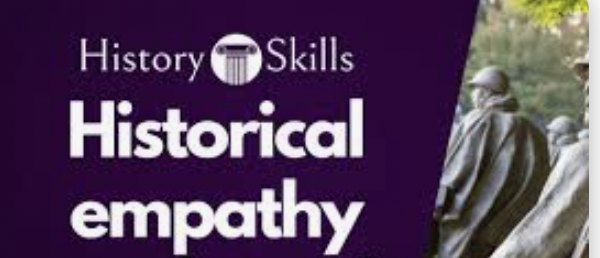
Learning Intentions:
I am learning about the definition of empathy and will apply this concept to the biographies.
Success Criteria:
I understand NZ's participation in WW1 and the sacrifice our soldiers made for Aotearoa.I am also learning about their experiences through their biographies
I can show empathy towards the ANZAC’S by learning about their experiences through their biographies
Activities:
DO NOW: Holistic report evidence
Introducing Assessment 1 and Exploring the biographies
Resources:
- Biographies (https://nzhistory.govt.nz/war/anzacday-biographies)
- Documentary (https://www.nzonscreen.com/title/gallipoli-the-new-zealand-story-1984?collection=anzac-day) -
EXPLORE / TŪHURA learning intentions:
- We are EXPLORING Matariki by communicating the spiritual ideas and values behind the celebration
- We are EXPLORING Matariki by recognising the key figures involved in this historical moment
Success Criteria:
- We understand the importance of Matariki and it's traditional practice.
Activities:
- Exam paper practice: Matariki resource interpretation
- Opinion writing piece on Matariki
-
EXPLORE / TŪHURA learning intentions:
- We are EXPLORING culture and collective identity by gaining an understanding about the concept of race and racism.
Success Criteria
- We are developing an understanding of key terms and ideas that are associated with racism including what constitutes ethnicity and ethnic groups.
- We are understanding that all ethnic groups experience some form of racism.
Activities:
- Brainstorm activity 1 as a class and copy information in your book
- Watch the video for activity 2 and complete answers in your book.
- Activity 3 - class discussion
-Activity 4 (Skin whitening ) and 5 (race test)
-
FOCUS / ARONGA learning intentions:
- We are FOCUSING on describing racial discrimination in NZ by developing an understanding of how people challenge injustices and social norms
Success Criteria
- We are developing an understanding of key terms and ideas that are associated with racism including what constitutes ethnicity and ethnic groups.
- We are understanding the link between stereotyping, discrimination and racism.
Activities:
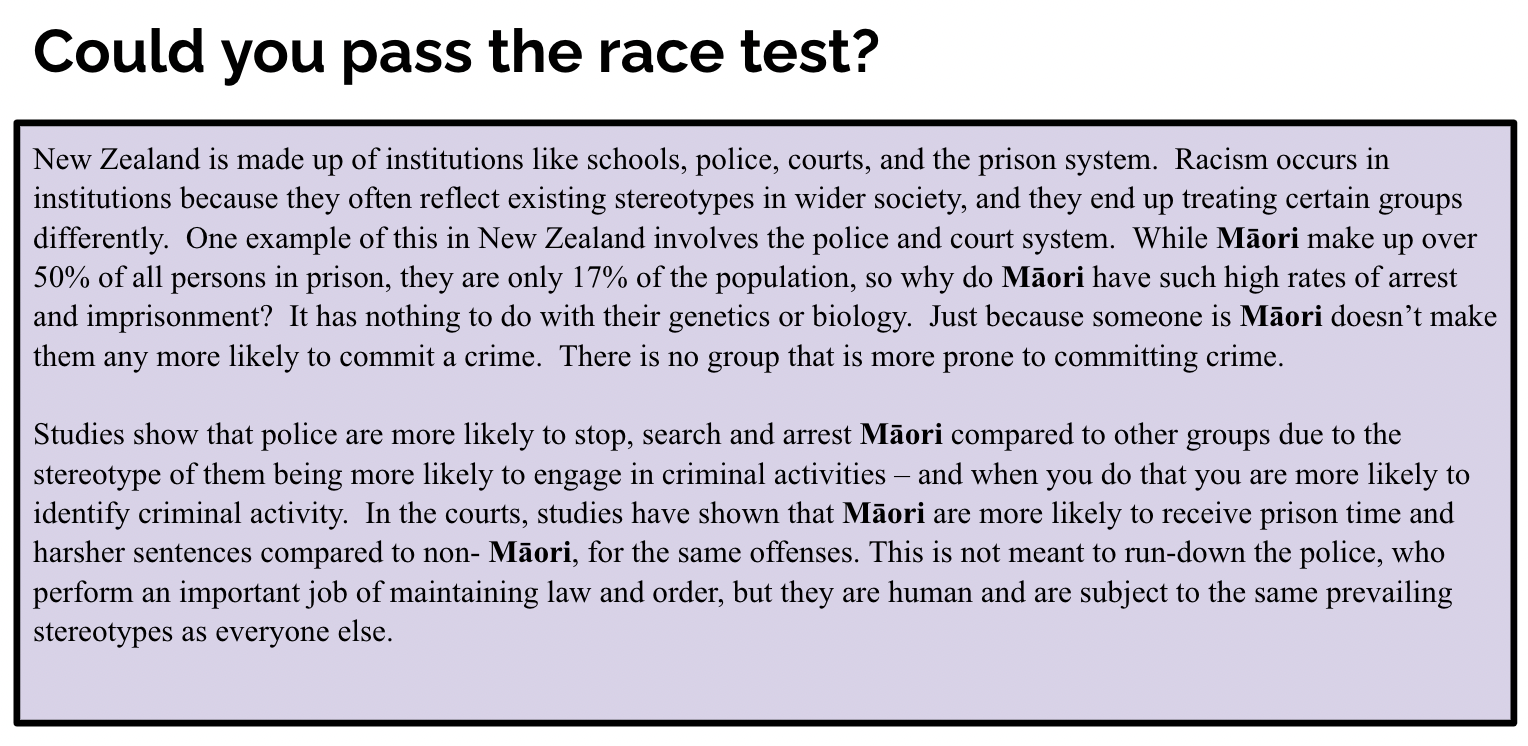
- Activity 6
You and your group will read through the powerpoint on Google classroom
Powerpoint: Stuff NZ has created an interesting Powerpoint that looks at this issue more closely.
HYPERLINK "https://interactives.stuff.co.nz/2018/05/prisons/crime.html#/" https://interactives.stuff.co.nz/2018/05/prisons/crime.html#/
Group Activity:
-Break up into groups of 5-6 – each group will be given a single sheet of paper.
-Watch the Powerpoint presentation as a group.
-Discuss the information and work together to write down at least 5 key takeaways in the form of dot-points.
-Please do not copy word for word – write your group’s key points in your own words. -
FOCUS / ARONGA learning intentions:
- We are FOCUSING on describing racial discrimination in NZ by developing an understanding of how people challenge injustices and social norms
Success Criteria
- We are understanding the concepts that we studied last last week and are now applying them to the text
- We are understanding the injustices of the Maori people during the 1800's in Pukekohe.
Activity:
DO NOW: Forming an opinion
Introduction to the book: "No Maori Allowed" (We will begin reading the book today in class)
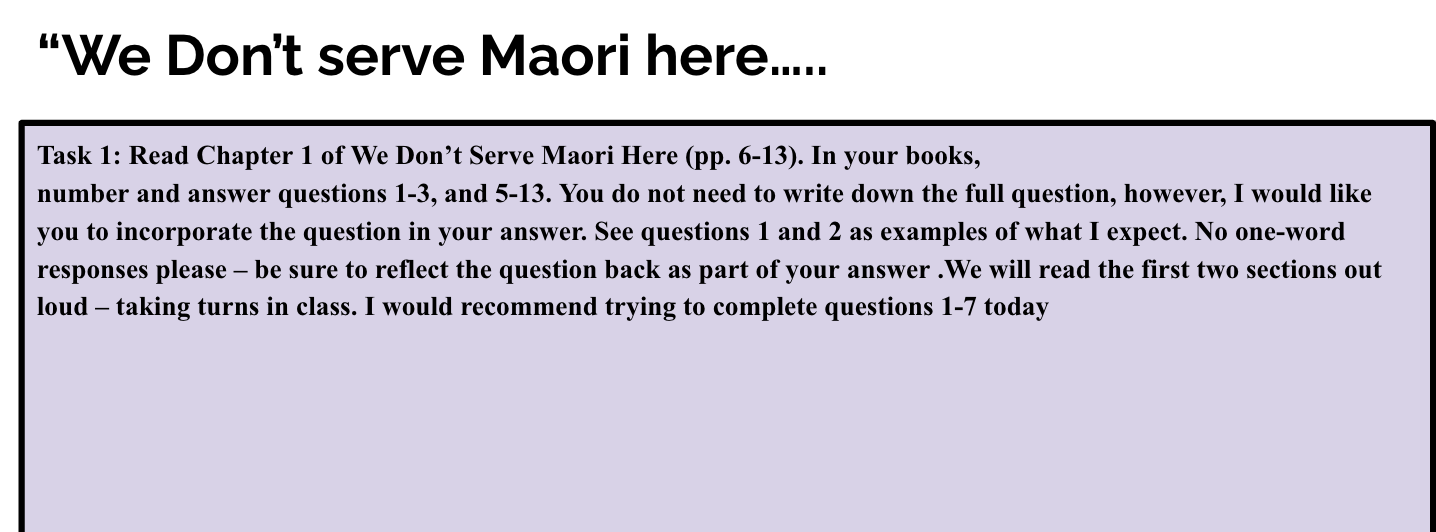
-
Opened: Thursday, 23 May 2024, 12:00 AMDue: Thursday, 6 June 2024, 7:00 PM
-
FOCUS / ARONGA learning intentions:
- We are FOCUSING on describing racial discrimination in NZ by developing an understanding of how people challenge injustices and social norms
Success Criteria
- We are understanding the injustices of the Maori people during the 1800's in Pukekohe.
- We are analysing data and connecting this to the documentary and information from Chapter 2
Activity:
- Watching the documentary and connecting this to Chapter 1 and 2 (T chart to highlight the comparisons)
- Completing the questions after reading Pages 15-20 from Chapter 2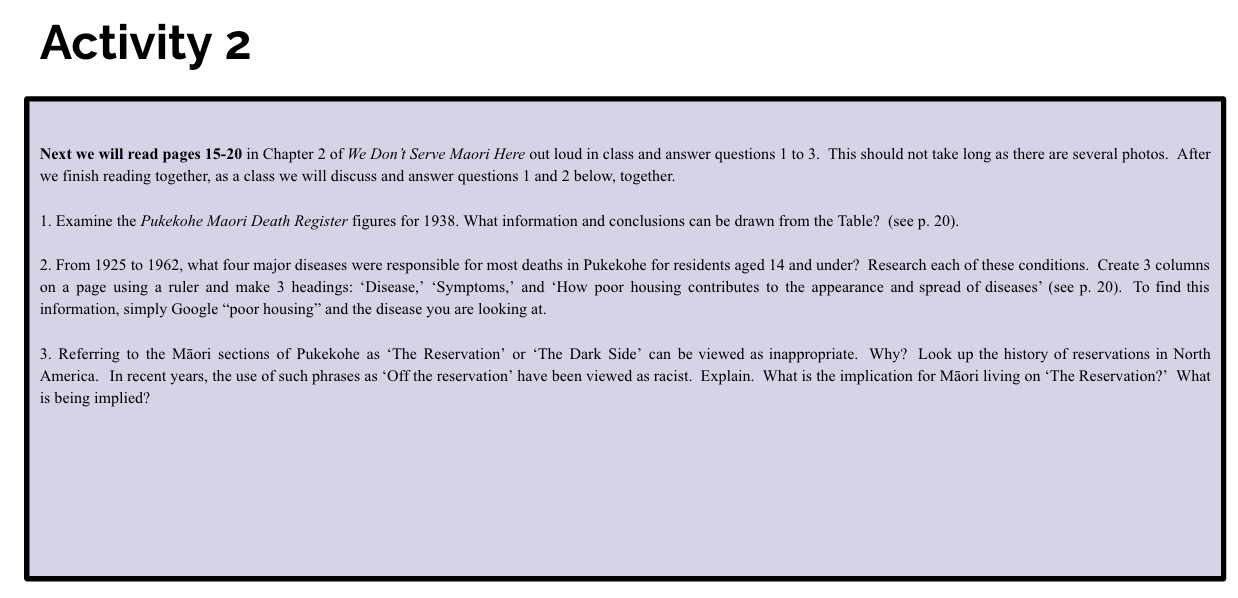
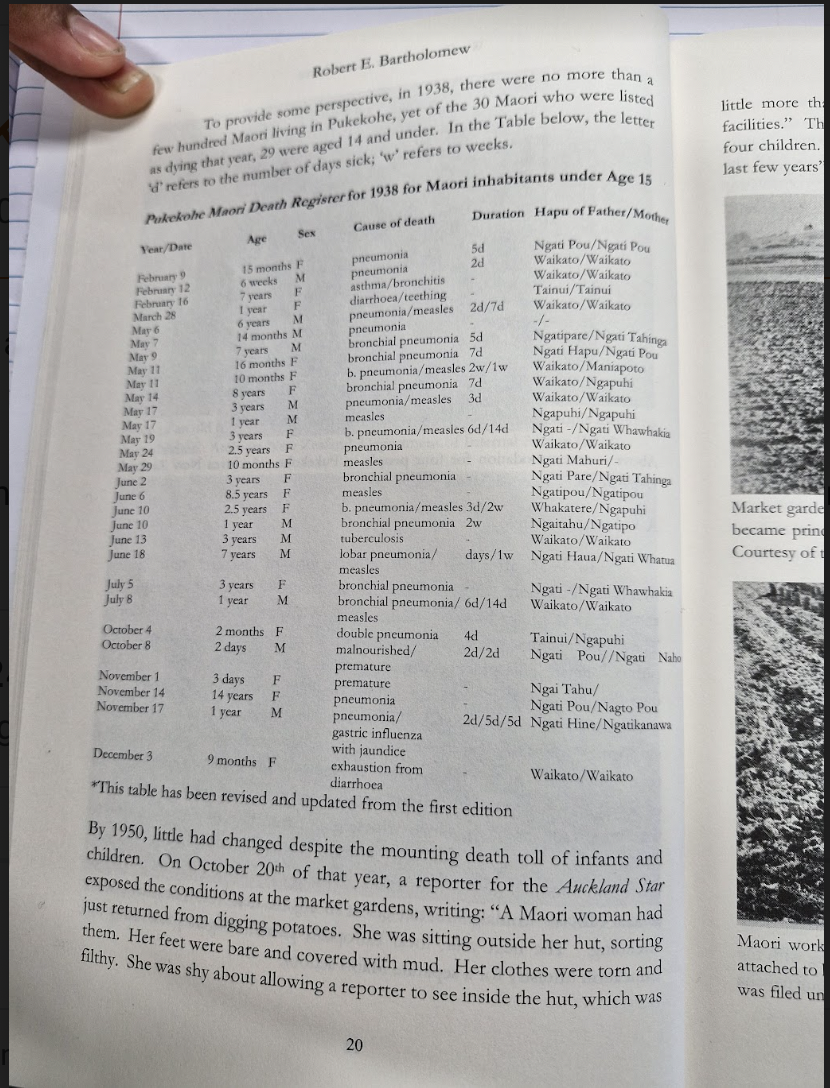
-
FOCUS / ARONGA learning intentions:
- We are FOCUSING on describing racial discrimination in NZ by developing an understanding of how people challenge injustices and social norms
Success Criteria:
- We are understanding the concept of segregation in relation to the background of Maori living in Pukekohe
- We are able to identify and describe the types of injustices Maori faced in Pukekohe
- We can draw conclusions as to why they have experienced these injustices and how these injustices have impacted the Maori people in Pukekohe
Activities:
- "No Maori allowed" documentary - watch, make bullet point and analyse information to draw conclusions
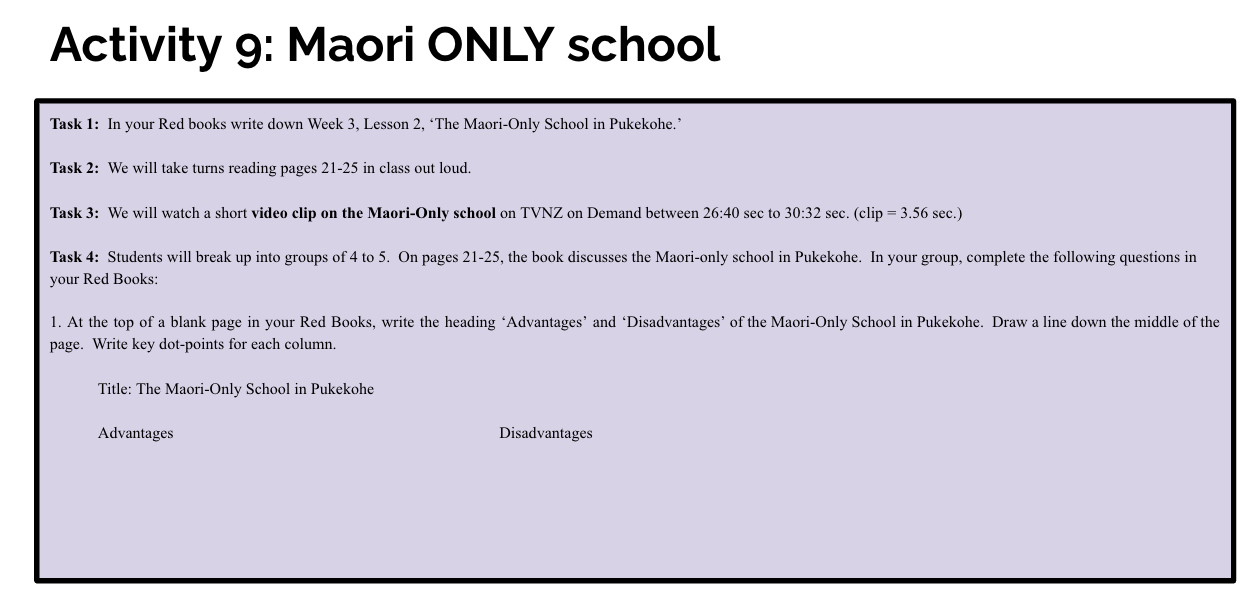
-
FOCUS / ARONGA learning intentions:
- We are FOCUSING on describing racial discrimination in NZ by developing an understanding of how people challenge injustices and social norms
Success Criteria:
- We are understanding the concept of segregation in relation to the background of Maori living in Pukekohe
- We are able to identify and describe the types of injustices Maori faced in Pukekohe
- We can draw conclusions as to why they have experienced these injustices and how these injustices have impacted the Maori people in Pukekohe
Activities:
1."No Maori allowed" documentary - watch, make bullet point and analyse information to draw conclusions.
2. Answer the following writing a paragraph: One of the reasons given by European parents for creating a separate school was the health threat posed by Māori students. Based on what you have read, and in your opinion, was this threat justified? Explain your response
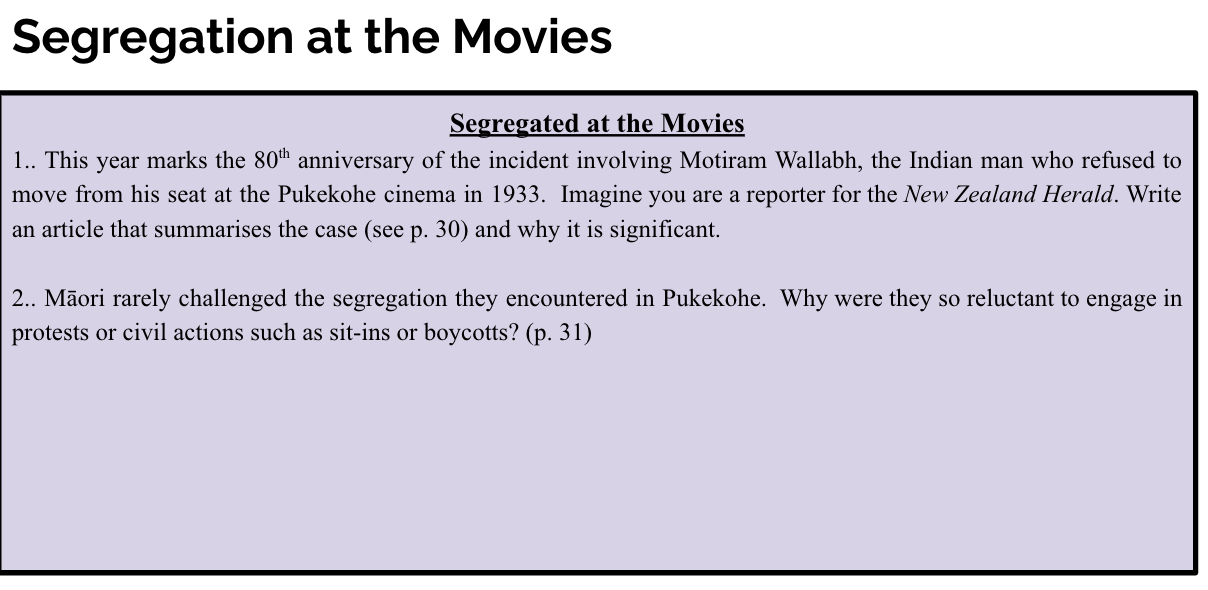
-
FOCUS / ARONGA learning intentions:
- We are FOCUSING on describing racial discrimination in NZ by developing an understanding of how people challenge injustices and social norms
Success Criteria:
- We are understanding the concept of segregation in relation to the background of Maori living in Pukekohe
- We are able to identify and describe the types of injustices Maori faced in Pukekohe
- We can draw conclusions as to why they have experienced these injustices and how these injustices have impacted the Maori people in Pukekohe.
Activities:
1. Note-taking from Documentary, Chapter 2 and some of Chapter 3.
2. Create 3/4 focus questions for the assessment and finalise the questions by the end of Week 1
3. Familiarise yourself with the rubric
-
EXPLORE / TŪHURA learning intentions:
- We are EXPLORING the opening ceremony and types of sports of the Paris Olympics
- We are EXPLORING the ancient and modern Olympics and the significance of the mascots
Success Criteria:
- We understand the the origins and traditions of the Olympics and how the event has changed over time.
- We understand the the significance of the mascots and the significance of the opening ceremony
ACTIVITIES:
DO NOW: Check in on your Assessment 2 (Note taking for Chapter 2)
Opening ceremony task: What aspects of our culture, values and national identity does the countries highlight? (Literacy)
Pair share task: If there was an opportunity to add in another sport to the current list, what sport would you add and why? (Literacy task)
Documentary:Ancient Olympics
Interactive Activity Online: Pair share/Individual option: https://www.bbc.co.uk/bitesize/articles/z36j7ty#z42gr2p
-
EXPLORE / TŪHURA learning intentions:
- We are EXPLORING the opening ceremony and types of sports of the Paris Olympics
- We are EXPLORING the ancient and modern Olympics and the significance of the mascots
Success Criteria:
- We understand the the origins and traditions of the Olympics and how the event has changed over time.
- We understand the the significance of the mascots and the significance of the opening ceremony
ACTIVITIES:
DO NOW: Check in on your Assessment 2
Documentary Analysis:Ancient Olympics
Interactive Activity Online: Pair share/Individual option: https://www.bbc.co.uk/bitesize/articles/z36j7ty#z42gr2p
-
EXPLORE / TŪHURA learning intentions:
- We are EXPLORING the Olympics by investigating and researching the history of the games, the medals, and mascots as well as customs and traditions of the host country.
- We are EXPLORING the Olympics by understanding the Olympic values and how they apply to everyday life.
Success Criteria:
- We understand the the origins and traditions of the Olympics and how the event has changed over time.
- We understand the the significance of the values and can apply this to our daily life
- We understand the the significance of the values and can compare this to the MHJC values.
Activities:
DO NOW: Check in on Assessment 2 (Answers to the focus questions)
- Research task doc (Research doc with questions)
- Olympic values (https://www.youtube.com/watch?v=nQmYNNUzuOA)
- 2 x Literacy tasks below
What does the word Excellence mean to you?
What does the word friendship mean to you?
What do you think respect means?
Why are these Olympics values important?
- Creating word clouds to highlight each value and answer the question below: (Literacy)
Using the Word cloud website, use the values ABOVE to create these clouds: https://www.wordclouds.com/
Here are some examples: https://docs.google.com/document/d/1RW3goEYOPSGen0gabrAL1GkD-mAQwiV0eM34U3pFQUQ/edit
-
EXPLORE / TŪHURA learning intentions:
- We are EXPLORING customs and traditions of the host country
- We are EXPLORING the countries being represented at the Olympic games. and their locations on the world map
Success Criteria:
- We understand the customs and traditions of the host country
- We are identifying Olympic teams on the world map
Activities:
DO NOW:Work on your assessment
Mapping task:
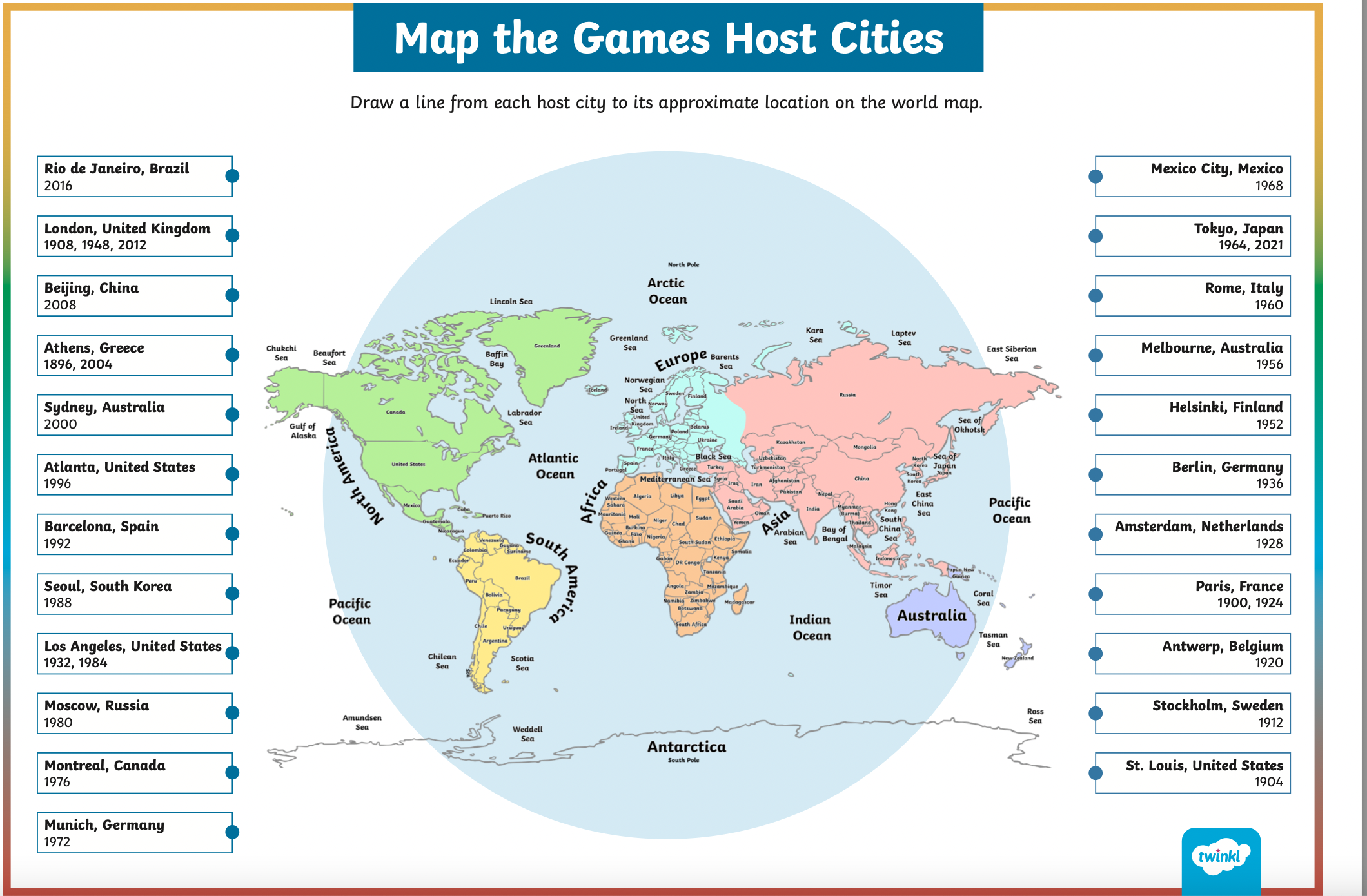
-
FOCUS / ARONGA learning intentions:
- We are FOCUSING on developing our understanding of the Olympic games by describing the outcome of Abandoned Olympic stadiums before and after the games
- We are FOCUSING on identifying and discussing the criteria used to select a host city and the challenges faced by the host city before the opening of the games.
Success Criteria:
- We understand the challenges faced by the host city prior to the games
Activities:
- Reading the article from Investopedia and discussing in your groups (Literacy task)
- Answer questions presented in class (Literacy task)
-
Opened: Thursday, 22 August 2024, 12:00 AMDue: Saturday, 31 August 2024, 10:00 PM
-
FOCUS / ARONGA learning intentions:
- We are FOCUSING on developing our understanding of the Olympic games by describing the outcome of Abandoned Olympic stadiums before and after the games
- We are FOCUSING on identifying and discussing the criteria used to select a host city and the challenges faced by the host city before the opening of the games.
Success Criteria:
- We understand climate graphs and can interpret the data
Activities:
1. Climate Graph video - tasks online
2. Google classroom doc (Climate during the Paris Olympics)
-
FOCUS / ARONGA learning intentions:
- We are FOCUSING on developing our understanding of the Olympic games by describing the outcome of Abandoned Olympic stadiums before and after the games
- We are FOCUSING on identifying and discussing the criteria used to select a host city and the challenges faced by the host city before the opening of the games.
Success Criteria:
- We understand the challenges faced by the host city prior to the games
Activities:
1. CNN Article (Q & A) - details will be explained in class.
2. Article: Underdogs: https://www.bbc.com/future/article/20240802-why-do-underdogs-in-sports-and-politics-gain-support
After reading the article, what are key learnings from the article
-
FOCUS / ARONGA learning intentions:
- We are FOCUSING on discussing politics in the Olympics by investigating various significant political events at the past Olympic games.
- We are FOCUSING on developing our understanding of the Olympics games by considering the economic and social impacts on host cities
Success Criteria
- We are looking at various significant political events at the past Olympic games.
- We are the challenges faced by the host country when the stadiums are abandoned post Olympics
Activities:
- Research task: Political event
- Documentary: 1936 Olympics: https://www.youtube.com/watch?v=gn-Xg158TcQ
-
FOCUS / ARONGA learning intentions:
- We are FOCUSING on discussing politics in the Olympics by investigating various significant political events at the past Olympic games.
- We are FOCUSING on developing our understanding of the Olympics games by considering the economic and social impacts on host cities
Success Criteria
- We are looking at various significant political events at the past Olympic games.
- We are the challenges faced by the host country when the stadiums are abandoned post Olympics
Activities:
- Research task: Political event
- Documentary: 1936 Olympics: https://www.youtube.com/watch?v=gn-Xg158TcQ
- Education perfect: Interpreting graphs
- The Conservation article (Practice)
- Practice paper -2023
-
THIS WEEK TO WILL CONTINUE WITH OUR POLITICAL EVENTS SILDESHOW. YOU SHOULD AIM TO COMPLETE THIS BY WEEK 2.
FOCUS / ARONGA learning intentions:
- We are FOCUSING on discussing politics in the Olympics by investigating various significant political events at the past Olympic games.
- We are FOCUSING on developing our understanding of the Olympics games by considering the economic and social impacts on host cities
Success Criteria
- We are looking at various significant political events at the past Olympic games.
- We are the challenges faced by the host country when the stadiums are abandoned post Olympics
Activities:
- Research task: Political event
- Powtoon presentation presentation
-
FOCUS / ARONGA learning intentions:
- We are FOCUSING on practising our skills for our upcoming CAT exam
Success Criteria
- We understanding the basics of graphs and we reinforce our learning with both our geography skills and reinforce interpretation.
Activities:
- Do now: Revision tasks (Graphing and Geography)
- Resource Interpretation
- Presentation of your slides (Political event)
-
FOCUS / ARONGA learning intentions:
- We are FOCUSING on practising our skills for our upcoming CAT exam
Success Criteria
- We understanding the basics of graphs and we reinforce our learning with both our geography skills and reinforce interpretation.
Activities:
- Do now: Education Perfect (Graphing and Geography)
- Resource Interpretation/Practice paper (2023)
-
EXPLORE / TŪHURA learning intentions:
- We are EXPLORING the way certain companies target children to consume unhealthy products and whether it is morally appropriate.
Success Criteria:
Students will be able to recite basic definitions that surround the term Consumerism and be aware of the many products and services that they consume on a daily basis. They will also have a greater awareness of the way certain companies target children to consume unhealthy products and whether or not it is morally appropriate
Activities:
What does caveat emptor mean?
Write down the following definition of Consumerism
Complete Task B
Class Discussion:
Do you think that companies often target children your age with unhealthy products that taste good in order to make money - Watch youtube video.
Revision Task for CAT
-
EXPLORE / TŪHURA learning intentions:
- We are EXPLORING the way certain companies target children to consume unhealthy products and whether it is morally appropriate.
Success Criteria
- Students will be able to recite basic definitions that surround the term Consumerism and be aware of the many products and services that they consume on a daily basis. They will also have a greater awareness of the way certain companies target children to consume unhealthy products and whether or not it is morally appropriate
Activities:
Class discussion1.Do you think that there should be laws that stop companies from targeting children with unhealthy products or should it be up to the child to decide for themselves what they want to eat or not?
2 Read the article, ‘Unhealthy food marketed to Kiwi kids by Belinda Castles at: https://www.consumer.org.nz/articles/marketing-food-to- children
Answer the following questions based on the above article:
1. What ways do companies get kids your age to buy/eat unhealthy foods – how are they advertised? (see paragraph 1 and 2).
2. Go down to the bottom of the article under the section – ’10 Lunchbox Snacks to Avoid.’
Pick 3 of these snacks. Show:
1) Why they are not healthy, and
2) How the packaging of the item is designed to be attractive to children Refer to the example below: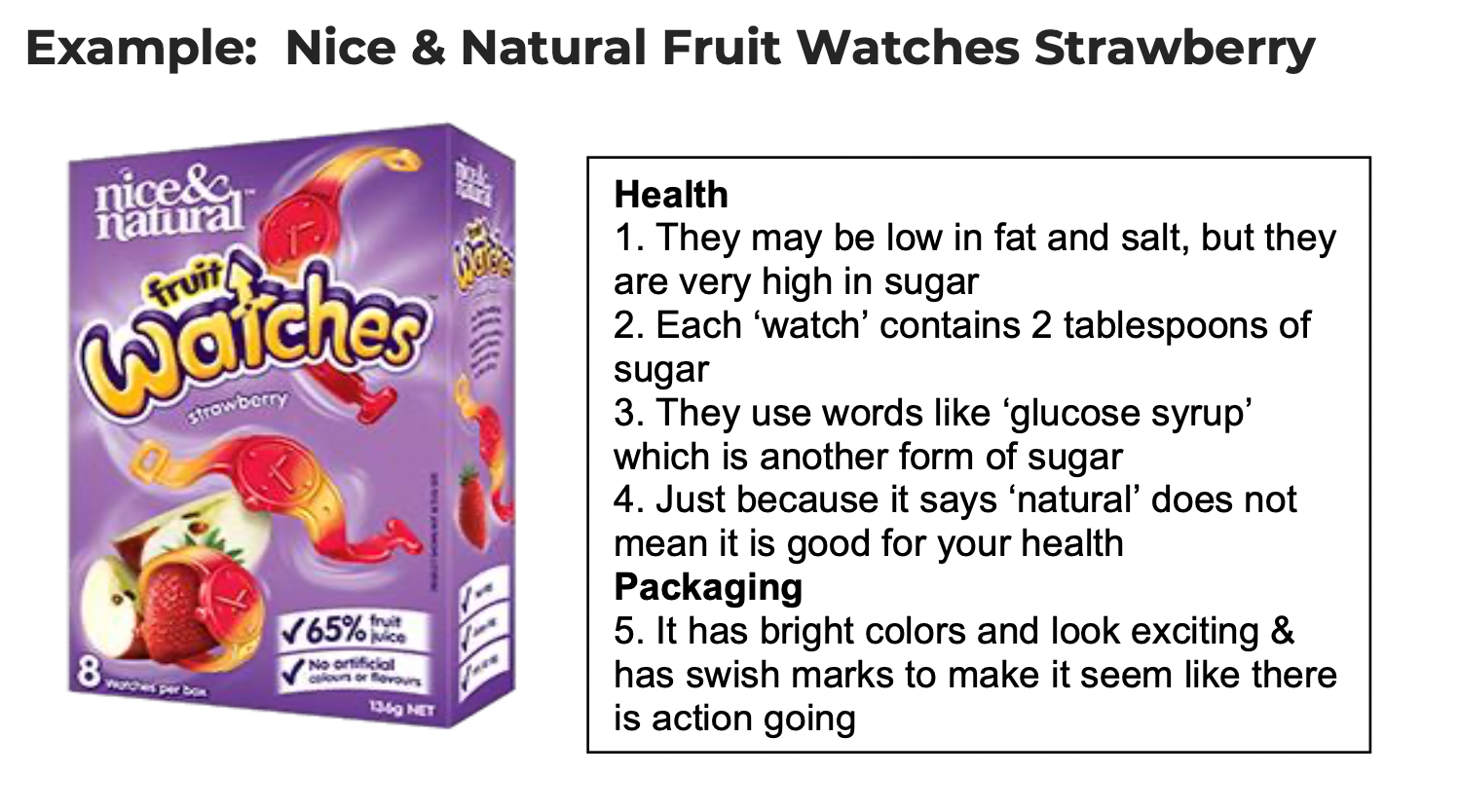
-
EXPLORE / TŪHURA learning intentions:
- We are EXPLORING the way certain companies target children to consume unhealthy products and whether it is morally appropriate.
Success Criteria
- Students will be able to recite basic definitions that surround the term Consumerism and be aware of the many products and services that they consume on a daily basis. They will also have a greater awareness of the way certain companies target children to consume unhealthy products and whether or not it is morally appropriate
- Read the following article (Pairshare): https://www.consumer.org.nz/articles/marketing-food-to-children. Complete graphic organiser task on google classroom.- Read the food labels.- CAT Revision -
FOCUS / ARONGA learning intentions:
- We are FOCUSING on learning how supermarkets and other big companies target children with unhealthy products that taste good in order to make money
- We are FOCUSING on consumerism by developing our understanding of consumer scams and consumer issues.
Success Criteria:
- We are understand the impact of how the NZ supermarkets target consumers to unhealthy food items.
Activities:
- Documentary: https://www.youtube.com/watch?v=myv7yydtCKc
- https://www.nzherald.co.nz/nz/virtual-supermarket-shows-junk-food-taxes-spur-healthier-shopping/ZYPUUFIFVP6UIDUULKUHP5DHNY/
- https://www.rnz.co.nz/programmes/off-the-shelf/story/2018907996/junk-food-advertising-a-major-contributor-to-obesity
-
FOCUS / ARONGA learning intentions:
- We are FOCUSING on learning how supermarkets and other big companies target children with unhealthy products that taste good in order to make money
- We are FOCUSING on consumerism by developing our understanding of consumer scams and consumer issues.
Success Criteria:
We will be able to recite 3 substances that are used by major corporations to get us to consume more food than we need, and possible solutions.
We will become familiar with what a scam is and the many different types of scams that are circulating in New Zealand
Activities:
Task: Watch the documentary “Tricked Into Eating More…”
https://www.youtube.com/watch?v=l0B1xMu-uow
Task 1: Scams are a huge problem in New Zealand, costing Kiwis millions of dollars each year. Watch the short video clip on a recent mobile phone scam:
Class Discussion: Without naming specific people, are you aware of anyone who has been the victim of a scam? Do you think it could never happen to you?
The New Zealand Consumer website lists 14 different types of common scams. Here is the link:
https://www.consumerprotection.govt.nz/general-help/scamwatch/how-to-avoid-scams/case-studies/
-
Kia Ora
This week, you will be reflecting on your skill development in Global Studies.You will then create a list of skills that you need to develop for 2025 in preparation for year 10, especially NCEA.
Have a well deserved break and enjoy your summer holidays.
